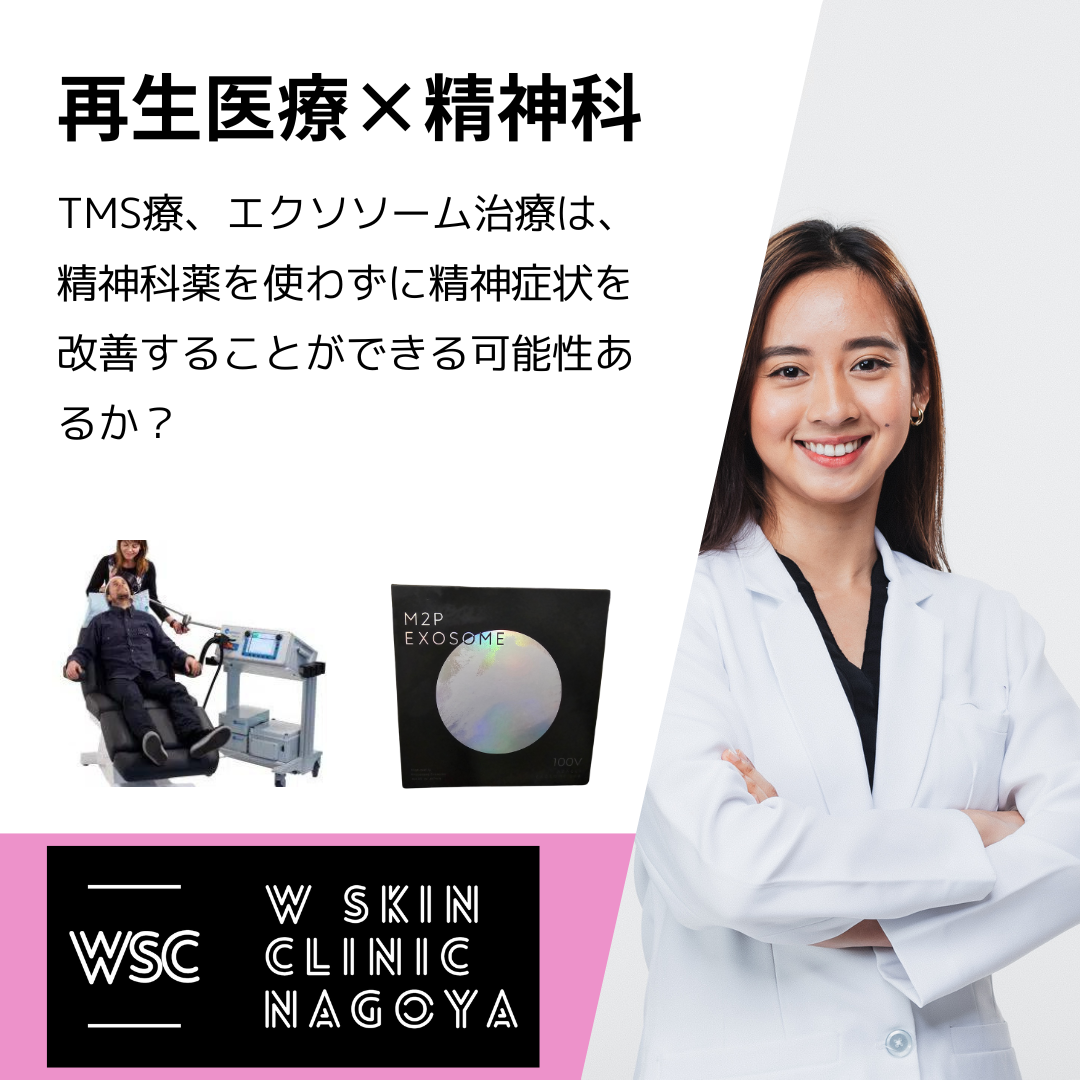NEWSお知らせ
2024.12.21|ブログ
再生医療×精神科医療、TMS治療、エクソソーム治療は、精神科薬を使わずに精神症状を改善することができる可能性あるか?その根拠は?名古屋の美容皮膚科医が解説

再生医療×精神科医療、TMS治療、エクソソーム治療は、精神科薬を使わずに精神症状を改善することができる可能性あるか?その根拠は?名古屋の美容皮膚科医が解説
こんにちは、Wスキンクリニック名古屋、院長の加藤晃司です。
今回は、再生医療×精神科医療、TMS治療、エクソソーム治療は、精神科薬を使わずに精神症状を改善することができる可能性あるか?その根拠は?について解説します。
再生医療と精神科医療を組み合わせたTMS治療(経頭蓋磁気刺激)やエクソソーム治療は、精神科薬を使用せずに精神症状を改善する可能性があります。これらの治療法はそれぞれ異なるメカニズムで神経や細胞に働きかけ、精神症状の改善を目指すものです。その根拠と可能性について以下に詳しく説明します。
- TMS治療(経頭蓋磁気刺激)
特徴とメカニズム
非侵襲的治療:
脳に磁気パルスを送ることで、神経細胞を刺激。
神経回路の調整:
脳の特定部位(多くは前頭前野)をターゲットにし、神経ネットワークの活動を正常化。
うつ病では前頭前野の活動低下が問題とされ、これを改善する。
神経伝達物質の調節:
セロトニン、ドーパミン、ノルアドレナリンなどの神経伝達物質の放出を促進。
精神症状への効果
うつ病:
抗うつ薬に抵抗性の患者に対しても効果があるとされ、多くの研究でその有効性が確認されています。
強迫性障害(OCD):
強迫行動や不安を抑制する効果が報告されています。
注意欠陥・多動性障害(ADHD):
前頭前野の活動を調整し、集中力や衝動性を改善。
根拠
FDA承認:
TMSは治療抵抗性うつ病やOCDに対してFDA(米国食品医薬品局)に承認されています。
臨床研究:
多くの研究で薬物療法に匹敵する効果が示され、副作用が少ないことが報告されています。
- エクソソーム治療
特徴とメカニズム
細胞由来の微小なカプセル:
幹細胞から分泌されるナノサイズの小胞で、成長因子やmiRNAを含む。
神経再生と炎症抑制:
神経細胞の修復、再生、炎症の抑制に寄与。
脳機能の改善:
神経ネットワークの修復を促進し、脳全体の機能を向上。
精神症状への効果
うつ症状:
脳内の炎症がうつ病に関与している場合、エクソソームの抗炎症作用が症状を緩和する可能性がある。
認知機能の改善:
記憶力や集中力の向上が期待され、ADHDや軽度認知障害(MCI)に適応可能。
ストレス関連障害:
神経保護作用により、ストレスによる神経のダメージを軽減。
根拠
基礎研究:
エクソソームが神経細胞の修復を促進することが動物モデルで確認されている。
臨床研究:
現在進行中の研究で、精神科領域への適応可能性が示唆されている。
- 精神科薬を使わない治療の可能性
(1) メリット
副作用の軽減:
精神科薬は体重増加、眠気、倦怠感などの副作用があるが、TMSやエクソソーム治療はこれらが少ない。
依存性がない:
精神科薬の一部には依存性のリスクがあるが、再生医療は依存性の心配がない。
薬剤耐性患者への選択肢:
薬が効かない、または効果が薄い患者に対して有効な治療となる可能性。
(2) 限界と課題
治療効果の持続性:
TMSやエクソソーム治療の効果がどの程度持続するかについては、まだ十分な研究が必要。
治療費:
現在のところ再生医療は保険適用外が多く、治療費が高額になりがち。
- まとめ
TMS治療
非侵襲的で安全性が高い治療法として、うつ病やOCD、ADHDなどに対して有効性が確認されています。
薬剤に抵抗性がある患者や副作用を避けたい患者にとって優れた選択肢となり得ます。
エクソソーム治療
神経再生や炎症抑制を通じて、うつ症状やストレス関連障害の改善が期待されます。
新しい治療法としてのポテンシャルは高いが、現時点では研究段階であり、標準治療として確立されるにはさらなる臨床データが必要です。
精神科薬を使わない可能性
薬物治療に代わる選択肢としてTMS治療やエクソソーム治療は注目されています。
これらの治療法を単独または補助的に使用することで、副作用が少なく、自然な形で精神症状を改善できる可能性が期待されています。
最終的には、医師と相談の上で治療プランを立てることが重要です。再生医療の可能性は広がっており、個々の症状に応じて適切な治療が選択されるべきです。
うつ病、強迫性障害、不安障害、ADHD、ASDなど、精神症状の治療で精神科薬を使わない、もしくは今使っている薬を減らしたい、というニーズはあると思います。
当法人では再生医療から生まれた治療を精神科領域に応用しています。
TMS治療、エクソソーム治療に関してはデータも蓄積解析し、論文作成し、エビデンスを高めていこうと試みています。
どちらも現在もモニターを募集しています。
ご興味のある方は、当院までお問合せください。
<当院で施術可能な、再生医療×精神科治療>
TMS治療はこちら
https://www.w-clinic-nagoya.com/tms
Wスキンクリニック名古屋でのエクソソーム治療はこちら
https://www.w-clinic-nagoya.com/acne/exosome
NMN点滴はこちら
https://www.w-clinic-nagoya.com/beauty-drip/nmn
高濃度ビタミンC点滴はこちら
https://www.w-clinic-nagoya.com/beauty-drip/vitamin-c
*当院では
NMNは一般社団法人NMN医療研究会、エクソソームはセルソース株式会社のM2P-エクソソームを使用しています。
当院では無料でスタッフカウンセリングを行なっております。
お気軽にご予約くださいませ
Wスキンクリニック名古屋 (美容皮膚科)
https://www.w-clinic-nagoya.com/
〒461-0005 愛知県名古屋市東区東桜 2-4-1 第3コジマビル6F
TEL 052-7377-7117(10:00~19:00)
LINE ID @w.nagoya
高岳駅より徒歩4分 / 新栄町駅より徒歩5分
お車でお越しの方
名鉄協商パーキングチケットをお渡しいたしますので、クリニック近くのパーキングをご利用ください。
ご予約、お問合せ、Wスキンクリニック名古屋公式LINEからも可能です。
LINE ID : @w.nagoya
友達追加は↓から
Wスキンクリニック名古屋公式インスタ↓
https://www.instagram.com/w.skinclinic.nagoya?igsh=NHhoODFnaXB2b2ll&utm_source=qr
Wスキンクリニック院長 加藤晃司インスタ↓
https://www.instagram.com/w.skin.nagoya.kojikato?igsh=aW9nbWZwNjNjZ3pz&utm_source=qr
Regenerative Medicine × Psychiatry: Can TMS and Exosome Therapy Improve Mental Health Without Psychiatric Medications?
Explained by Dr. Koji Kato, Cosmetic Dermatologist, W Skin Clinic Nagoya
Introduction
Hello, I’m Dr. Koji Kato, director of W Skin Clinic Nagoya.
Today, I’ll explain whether Transcranial Magnetic Stimulation (TMS) and Exosome Therapy, two cutting-edge approaches combining regenerative and psychiatric medicine, can improve mental health without the use of psychiatric medications.
TMS and Exosome Therapy: A New Frontier in Psychiatry
- TMS (Transcranial Magnetic Stimulation)
Mechanism
TMS is a non-invasive treatment that delivers magnetic pulses to specific areas of the brain, particularly the prefrontal cortex, to regulate neural activity.
Neural Circuit Modulation:
Stimulates underactive brain regions often linked to depression and anxiety.
Neurotransmitter Regulation:
Enhances the release of serotonin, dopamine, and norepinephrine, essential for mood stabilization.
Neuroplasticity:
Promotes brain adaptability, enabling long-term improvements in mood and cognitive functions.
Clinical Applications
Depression: Effective for treatment-resistant depression.
Obsessive-Compulsive Disorder (OCD): FDA-approved for reducing compulsive behaviors.
ADHD: Enhances focus and reduces impulsivity.
Evidence
FDA approval for treatment-resistant depression and OCD.
Numerous clinical studies demonstrate TMS’s efficacy with minimal side effects compared to medications.
- Exosome Therapy
Mechanism
Exosomes are nano-sized vesicles derived from stem cells, containing growth factors, proteins, and microRNA that aid in cellular repair and regeneration.
Neuroprotection and Repair:
Promotes the regeneration of damaged neurons and enhances brain plasticity.
Anti-Inflammatory Effects:
Reduces neuroinflammation, a key factor in depression and anxiety.
Enhanced Neural Communication:
Restores and strengthens synaptic connections, improving overall brain function.
Clinical Applications
Depression: Addresses inflammation-related symptoms.
Stress Disorders: Mitigates the effects of chronic stress on the brain.
Cognitive Impairment: Improves memory and focus, benefiting conditions like ADHD.
Evidence
Preclinical studies show exosomes enhance neural repair and reduce inflammation.
Emerging clinical trials suggest potential for broader psychiatric applications.
Potential of TMS and Exosome Therapy Without Medications
(1) Advantages
Reduced Side Effects:
Unlike psychiatric medications, these therapies have minimal systemic side effects, such as weight gain or sedation.
No Dependency Risk:
Medications like benzodiazepines can lead to dependency; TMS and exosomes do not pose such risks.
Alternative for Resistant Cases:
Effective for patients who do not respond to medications or prefer to avoid them.
(2) Challenges
Treatment Costs:
Both TMS and exosome therapy are relatively expensive and often not covered by insurance.
Limited Long-Term Data:
While promising, more research is needed to establish their efficacy as standalone treatments.
Addressing Common Mental Health Conditions
Depression
TMS: Increases activity in underactive brain areas, alleviating symptoms.
Exosome Therapy: Repairs neural damage and reduces inflammation.
OCD and Anxiety
TMS: Modulates circuits linked to compulsive behaviors and overactive fear responses.
Exosome Therapy: Enhances brain resilience to stress.
ADHD and Cognitive Disorders
TMS: Improves focus and impulse control through neural stimulation.
Exosome Therapy: Boosts cognitive repair and enhances neurotransmitter pathways.
Current Research and Clinical Evidence
At W Skin Clinic Nagoya, we actively combine regenerative medicine with psychiatric care, focusing on:
Data Collection and Analysis:
Monitoring outcomes to enhance understanding and refine protocols.
Academic Contributions:
Preparing research papers to build evidence for the broader adoption of these treatments.
Conclusion
TMS and exosome therapy represent promising avenues for improving mental health without relying on psychiatric medications. These treatments offer a unique, non-invasive approach to addressing complex conditions like depression, anxiety, ADHD, and OCD.
As the field of regenerative psychiatry evolves, these therapies could serve as standalone or complementary treatments for patients seeking alternatives to conventional medications.
If you’re interested in exploring these options, we’re currently recruiting participants for ongoing studies. Feel free to reach out to us at W Skin Clinic Nagoya for more information.




